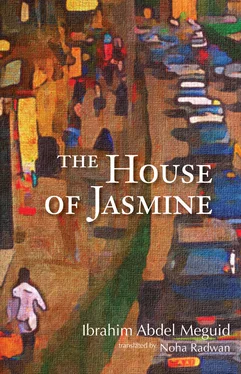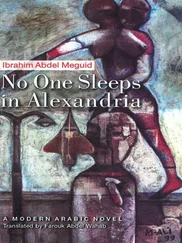I spent a maddening night. I felt like pounding my head with my own hands. I decided to kill them both — al-Fakahani, who sells rotten fruit, and Holy Yahya, who only inherited the title from his father, but has never actually seen Jerusalem, that short, stocky blond man with the red face and eyebrows, with arms as short as those of an insect and tiny hands. I bought a half-liter bottle of brandy and, drinking it for the first time in my life, I finished half of it. Then I slept like a dead man.
#
I got to work half an hour late. The administration offices were almost empty. Everyone was looking out the windows.
“The workers want to go out.”
“Why are they preventing them? Maybe it would be better to let them go out, or else they may destroy the shipyard.”
The workers’ chanting could be heard like a loud roar from behind the tall wall surrounding their work stations. What is all this anger in the air? Finally the main gates were opened wide, and a flood of workers rushed out. Some of them ran toward the administration offices to try to convince us to join them. There were about a hundred thousand workers, maybe more. I knew from the files in my office that we only employed ten thousand. Dozens of them were carried on others’ shoulders. I saw one with a white band around his head, madly waving a white handkerchief. He was attracting the most workers and was leading the whole demonstration.
“Who is he?” I asked the man standing next to me at the window, whom I noticed was remarkably overweight.
He laughed like an overjoyed child and said “You don’t know him! It’s Sayyid Birsho.”
“Oh!” I say, trying to hide my smile and my inability to understand. I find myself forced to advance toward Sayyid Birsho and the flood of angry workers pouring down Maks Street. Traffic is blocked, and passengers stream out of the tram and stopped cars. The windows of the houses overlooking the street are thrown open, and faces of women and children appear in them. They’re repeating the slogans, and I too am chanting along with Sayyid Birsho. I’m also looking carefully at the women’s faces in the windows above, white flowers perched on the tops of tall trees. I can’t hear their voices, because the roar of the workers is deafening, but I know from the movement of their lips and the waving of their arms that they’re repeating the slogans.
The government has certainly been wrong to raise the prices of so many products. All these masses can’t be wrong. But why am I not angry like they are? Why do the price increases not bother me, although I am hardly rich? Is it because I am single and on my own? Or because things happen in front of me, and I fail to notice them? A volcano is erupting around me, mountains are collapsing. “By hook or by crook, we will bring the government down. . ” What is Sayyid Birsho doing? “Who is in our parliament? Peasant thieves. . ” What is Sayyid Birsho saying? “Hey America, take your money back. Tomorrow the Arab people will crush you. . ” “The Zionists are on my land, and the Intelligence is at my door. . ” Sayyid Birsho isn’t afraid. “Tell the sleeper in ‘Abdin that the workers are hungry. . ” I look at Sayyid Birsho’s face more closely, a fleeting image, at once both dark and pale. I catch sight of him, and I see the eyes of a ferocious wolf in his face — two sharp and piercing eyes. But they are also filled with tears. Are those tears that I see in his eyes or clouds of sadness? The workers take turns carrying him. He is small enough to be taken for a fourteen year-old. All the slogans are his or a variation on what he yells.
Then the crowd’s movement, already at a crawl, slows down further. Maks Street is becoming too small for the flood. Sayyid Birsho signals everyone to stop. The other workers who are lifted on the shoulders of the crowd signal too. He enters a side alley with a large mob of workers. I am among this mob. Everything appears unbelievably well planned. Now we are in front of the Bata shoe factory. Hassanayn works here. Will I see him? “The free workers of the shipyard call the honest workers of Bata.” What if I see him? What if he sees me? Most of Bata’s workers are women and young girls. I know that. Here they are, looking out of the windows, chanting with us. I’m not chanting now. Where is Hassanayn? What does he do with all these hundreds of women around him? He must have to keep his eyes lowered all day long. I smile at the thought. “Long live the struggle of the Egyptian women. . ” Sayyid Birsho is mad. Now I’m chanting with him. I wish I could distinguish my voice in the din of the crowd. Some officials come out to negotiate with Sayyid Birsho. He shouts more slogans and refuses to negotiate. Suddenly I laugh at how tall I am. I feel, and I don’t know why just now, like Gulliver in the Land of Lilliput. Then the doors open, and a flood of men and women pour out of them. The two crowds mix. I worry about how to avoid rubbing against the girls in this crushing crowd. If only I could see Hassanayn. Our group is turning around to join the rest of the demonstration. It’s impossible for me to see Hassanayn. It’s impossible for anyone to recognize anyone else in this crowd. My God! Is this really our demonstration? Now it extends as far as I can see. The workers of the cement factory, the oil and chemicals factory, and the leather tanneries at Maks, the Valley of the Moon, and Dikhayla have joined in. This must be Resurrection Day! We advance further, and my height annoys me because it almost makes me trip several times. I feel the cold air above us. “You who rule us with the police. The whole people can feel your oppression. . ” I shout after Sayyid, looking at the high windows.
We arrive at al-Tarikh Bridge and discover that the huge demonstration has organized itself. The men are in the front. Now it will be Resurrection Day! The cotton ginners are blocking the side streets — an infinite number of men and women in rags and bare feet. On the bridge, the Central Police are forming a thick wall, blocking the far end. They raise their bamboo sticks in the air and hold their shields in front of them. There are numerous boxes filled with tear gas canisters at their feet. The voices of police chiefs are heard from behind them, shouting into megaphones and asking us to disperse before we expose ourselves to danger. The whole thing seems funny. Our demonstration actually stops, following a signal from Sayyid Birsho, who is still up on somebody’s shoulders. He moves as if he were on the back of a trained dancing horse, as if he were swimming on a series of synchronized waves. The air is becoming very cold, coming in from the port on our left and slapping our faces. The little kiosk shop at the bridge entrance is closed, and the blare of a radio is coming from inside. A popular Shadia song is on the radio. Shadia’s voice is very beautiful. The owner must have closed down in a hurry. “They dress in the latest fashion. We live ten to every room. . ” We chant after Sayyid Birsho. A long time passes. We don’t cross the bridge, nor do the Central Police advance towards us. It’s very strange. Sayyid Birsho shouts some greetings to the Central Police.
“What a guy!”
“Who is he?”
“That’s Sayyid Birsho. Don’t you know him?”
The voices are coming from behind me. Sayyid Birsho is advancing while Muhammad Qandil sings on the imprisoned radio: “Hey beautiful, say good morning, hey beautiful, look at me. . ” I am determined to follow Sayyid Birsho. The tear gas canisters explode in our faces and blue smoke fills the air. Many are dispersed in the alleys of Kafr ‘Ashri, but the main body of demonstrators remains strong, inching forward, the bridge shaking under our feet. The bamboo sticks sink into our bodies as we plunge into the wall of policemen. One of them attacks me. He is not taller than I am, but the stick raised above me makes him a giant, a vulture on the attack from a mountaintop. I catch the stick with my left arm, bend down, and lift him up between his legs. I find him light as a feather, and maybe because I am right next to the railing, I find myself throwing him in Mahmudiyya Canal. I hear his body splash into the stagnant dirty water.
Читать дальше












